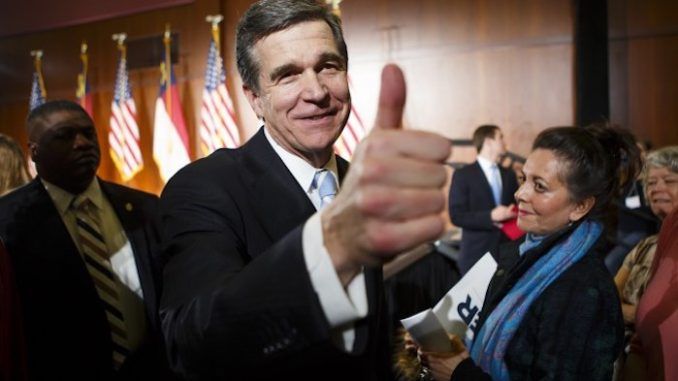
Democrat Gov. Roy Cooper has vetoed legislation requiring voters to present photo identification at the polls.
The North Carolina Governor slammed the states new voter ID law as “a solution in search of a problem.”
Wral.com reports: The General Assembly is expected to gather next week to override Cooper’s decision. Republicans hold a super-majority in both chambers, giving them the numbers to do so without help from legislators in Cooper’s party.

BYPASS THE CENSORS
Sign up to get unfiltered news delivered straight to your inbox.
You can unsubscribe any time. By subscribing you agree to our Terms of Use
They may get some, though. The bill got yes votes during the ongoing legislative session from Reps. Duane Hall, D-Wake, and Ken Goodman, D-Richmond, and Sens. Joel Ford, D-Mecklenburg, Ben Clark, D-Hoke, and Don Davis, D-Pitt.
Cooper said in his veto message that the state doesn’t need to require photo ID for people voting in person. In fact, the state constitution requires that now, though it allows for exceptions. Voters agreed to add it to the North Carolina Constitution during the November elections, and the General Assembly met in a lame-duck session to write more detailed rules while Republicans still held their super-majorities.
Democrats broke those veto-proof super-majorities in November, but that won’t take effect until January.
“We are certainly disappointed that Gov. Cooper chose to ignore the will of the people and reject a common-sense election integrity measure that is common in most states,” House Speaker Tim Moore said in a statement. “The North Carolina House will override his veto as soon as possible.”
“Governor Cooper’s veto explanation for the reasonable and bipartisan voter ID bill is a tired rehash of unconvincing talking points rejected by the voters,” Senate President Pro Tem Phil Berger said in a statement. “Despite the governor’s personal feelings on voter ID, the fact remains that the constitutional amendment passed with a broad mandate from North Carolinians. The governor is putting special interests ahead of the people’s will, and we plan to override the veto.”
Cooper said the proposed law “puts up barriers to voting that will trap honest voters in confusion and discourage them with new rules.” The bill’s fundamental flaw is its “sinister and cynical origins,” he said, and that it was “designed to suppress the rights of minority, poor and elderly voters.”
“The cost of disenfranchising those voters or any citizens is too high, and the risk of taking away the fundamental right to vote is too great, for this law to take effect,” Cooper said in his veto message.
North Carolina’s previous voter ID law was thrown out in 2016 by the federal courts, which decided GOP legislators targeted minority voters “with almost surgical precision” as they crafted that law and other election changes. The new bill, Senate Bill 824, is significantly broader in the sorts of IDs it would allow voters to present on election day.
Bob Phillips, executive director of good-government group North Carolina Common Cause, called the measure “deeply troubling.”
“Not only was this voter ID proposal pushed through by a lame-duck legislature without proper public input, but the measure fails to fully protect eligible voters in North Carolina,” Phillips said in a statement. “Make no mistake, this voter ID bill would have a negative effect on eligible voters, with a disproportionate impact on senior citizens, students and voters of color.”
Supporters have said the bill is needed to prevent voter fraud and to boost confidence in election security.
In his veto message, the governor also referenced the ongoing controversy over results in the state’s 9th Congressional District race, calling the absentee ballot concerns apparent in that election North Carolina’s “real election problem.”
The voter ID bill does require people to include a copy of their photo ID with absentee ballot requests, or an affidavit explaining why they could not. Legislators added the measure as a response to the 9th District controversy, but it’s unclear whether that would address the issues in that race.
A Bladen County operative has been accused of sending people door to door, not only to convince people to request absentee ballots and to witness those ballots en masse, which remains legal under this bill, but also to collect absentee ballots. Collecting ballots from a stranger is already illegal in North Carolina, due to tampering concerns.
Separate legislation on the governor’s desk would require absentee ballot witnesses to affirm that they know the person voting a ballot is who he or she says.
Cooper’s office said the governor signed two other bills Friday:
- House Bill 1025, which makes a number of small changes to state codes
- House Bill 1108, which deals with prison inmate pharmacy costs


